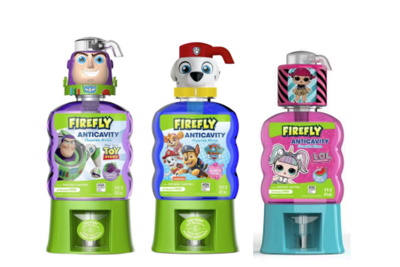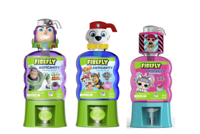
Firefly fluoride mouth rinse
CHICAGO - A federal judge won’t stop a class action accusing a children’s mouthwash manufacturer of marketing the product as safe for younger children despite evidence to the contrary.
U.S. District Judge Lindsay Jenkins issued an opinion Oct. 2 denying a motion to dismiss the third amended complaint mothers and grandmothers brought against Perrigo Company and Ranir regarding Firefly Anticavity Fluoride Rinse.
“Firefly’s container is shaped like a toy and decorated with cartoon characters popular among preschool-aged children such as Paw Patrol and Buzz Lightyear,” Jenkins wrote, citing the plaintiffs’ allegations. “And the rinse comes in different colors and flavors, including Bubble Berry, Wild Melon, Bubble Gum and Ocean Melon.”
The women said there is broad agreement among health authorities that children younger than 6 years old shouldn’t use over-the-counter fluoride rinses due to concerns of intoxication, tooth decay and vomiting. They pointed to U.S. Food and Drug Administration labeling requirements regarding product use and said the Firefly front labels use a small font size consumers can’t notice, while the warnings on the back indicating young children shouldn’t use the rinse without consulting a professional also are hard to read.
In arguing for dismissal, the companies said the complaint didn’t include facts supporting the inference the packaging would mislead reasonable consumers and also argued federal law pre-empted their deceptive practices claims.
Jenkins said the plaintiffs’ invocation of the Illinois Consumer Fraud and Deceptive Business Practices Act, as well as similar laws in other states, required an elevated pleading standard, specifically allegations of a deceptive promise, the intent for consumers to rely on packaging and actual financial damages to plaintiffs.
The Firefly packaging incorporated characters popular among preschoolers, Jenkins noted, and the complaint referenced reviews from other parents who bought the rinse for children younger than 6. She further noted the FDA has already indicated images appealing to children on products intended for older users is misleading, such as a 2018 warning letter sent to a distributor of tobacco products regarding use of cartoon characters and packages invoking Cinnamon Toast Crunch branding.
“While the reviews do not specify whether or why those parents believed Firefly to be safe for their children, it is a reasonable inference that a parent would not buy or allow their child to use a harmful product and an equally reasonable inference that the child friendly packaging played a role in their purchasing decisions,” Jenkins wrote. “That is enough to show, at the motion to dismiss stage, that Firefly’s packaging is likely to deceive a reasonable consumer.”
Jenkins further explained why warning labels on the back of products don’t prevent a package from being construed as misleading. She pointed to a 2020 U.S. Seventh Circuit Court of Appeals ruling, Bell v. Publix Super Markets, which concerned a front label promising “100% Grated Parmesan Cheese” while the back label disclosed the inclusion of preservatives.
“Many reasonable consumers do not instinctively parse every front label or read every back label before placing groceries in their carts,” Jenkins wrote, quoting the opinion and rejecting the argument Bell was limited to low-cost groceries. The ruling, she explained, “focused on the actions of a reasonable consumer” and said mouthwash itself is a low-cost, everyday item and Firefly is “presented as a toy (and not as a serious drug)” making consumers even less “likely to examine the back label to ensure that the toy-shaped, candy-flavored mouthwash depicting cartoon characters from shows popular for preschool children is indeed safe for preschool children.”
Regarding whether consumers relied on the packaging, Jenkins said the companies “cannot seriously contend that the elaborate design and tasty flavors of Firefly Rinse are intended for anything but enticing consumers to buy the product.”
The plaintiffs said they bought the rinse at Walmart and wouldn’t have bought it had they known it wasn’t safe for their children and grandchildren, which Jenkins said suffices to satisfy the allegation of financial damage.
Jenkins also rejected the pre-emption argument, noting the complaint seeks only to have a judge order the companies to alter packaging to make it compliant with the federal Food, Drug and Cosmetic Act, not to impose requirements more restrictive than what federal law stipulates.
“Plaintiffs’ claims are once again akin to Bell,” Jenkins wrote. “There, as here, the FDCA set out specific labeling requirements for the product at issue. There, as here, the defendants abided by many FDCA requirements. And there, as here, the plaintiffs complained about aspects of the product’s label that the defendants voluntarily added (in other words, aspects that the FDCA did not require) and which rendered the label and packaging misleading as a whole.”
The plaintiffs are represented in the case by attorney Michael Connett and others with the firm of Siri & Glimstad, of Los Angeles and New York.




